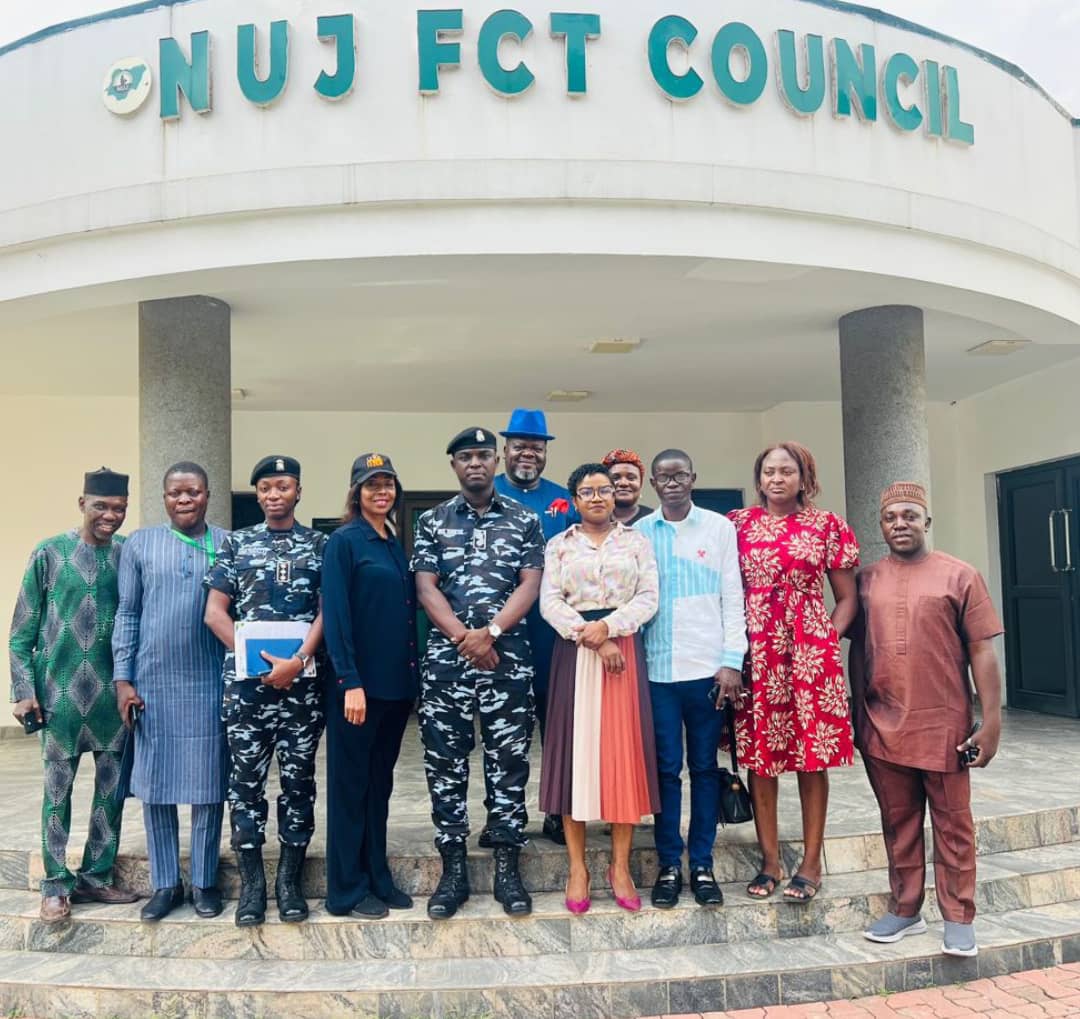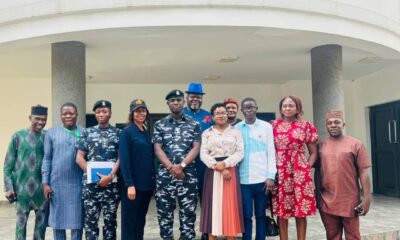NEWS
Why ALGON’s Private Sector Partnership On Agriculture Should Be Sustained

NEWS
Gov Fubara addresses Rivers People after Emergency Rule (Full Text)

Rivers State Governor, Siminalayi Fubara, has assured that his administration will work in harmony with the Rivers State House of Assembly to recover lost ground and fast-track the state’s social and economic growth.
In a statewide broadcast, Fubara described the period of emergency as one of the toughest phases in the state’s history. He said his decision not to challenge the presidential declaration was guided by the conviction that no sacrifice was too great for peace.
“The President graciously brokered peace during this period, and we all accepted it, though not without the hard lessons learnt during the emergency rule,” he noted.
The governor stressed that it was now the responsibility of leaders to set aside personal interests and focus on the collective good of Rivers State.
He expressed appreciation to President Bola Tinubu for what he termed a “fatherly intervention” that restored democratic governance in the state.
Fubara also acknowledged the role of his political leader, former Governor Nyesom Wike, along with the Senate President, the Speaker of the House of Representatives, and other stakeholders in sustaining peace. He further commended the Speaker and members of the state Assembly for their cooperation.
While assuring his supporters that “not everything is irretrievably lost,” he maintained that “the costly peace is cheaper than the cheapest war,” emphasizing the need to build a more prosperous Rivers.
He recalled some of his administration’s achievements before the emergency rule and promised to resume funding ongoing projects to ensure their completion.
The governor also reiterated his resolve to work with the House of Assembly in the interest of the people, thanking Rivers residents for their resilience, peaceful conduct, and prayers.
See full address below
STATEWIDE BROADCAST BY HIS EXCELLENCY, SIR SIMINALAYI FUBARA, GSSRS, ON FRIDAY, SEPTEMBER 19, 2025
My dear good people of Rivers State
Recall that Rivers State was placed under a six-month emergency rule, declared by Mr. President, His Excellency President Bola Ahmed Tinubu, GCFR, on the 18th of March, 2025, following the intense political crisis in our State.
2. It is without doubt that the last six months had been enormously challenging for our dear State under the emergency rule.
3. As your Governor, I accepted to abide by the state of emergency declaration and chose to cooperate with Mr. President and the National Assembly, guided by my conviction that no sacrifice was too great to secure peace, stability, and progress of Rivers State.
4. This was why I also resisted the pressure to challenge the constitutionality of the declaration of a state of emergency, the suspension of democratic institutions, and all other actions that we endured during this difficult period.
5. In the course of the six-month period, Mr. President graciously brokered the peace process with all the parties successfully. Our Leader, His Excellency, Nyesom Ezenwo Wike, CON, all members of the Rivers State House of Assembly and I, as your Governor, have all accepted to bury the hatchet and embrace peace and reconciliation in the best interest of our dear Rivers State.
6. We believe the political crisis is now behind us and that peace and stability have once again returned to Rivers State, though not without the hard lessons learnt from the emergency rule.
7. The responsibility now rests squarely on us: the Government, the State House of Assembly, political leaders and stakeholders to put aside our differences, work for the common good, and advance the interests of our people above all else. We have a duty to ensure that the peace we have all embraced remains permanent in our dear Rivers State.
8. On behalf of the Government and the good people of Rivers State, I extend our heartfelt gratitude to Mr. President for his fatherly disposition and decisive interventions in resolving the political crisis and for graciously restoring full democratic governance to our State.
9. Personally, I will never take Mr. President’s kindness for granted, and for that, I hereby reaffirm my utmost loyalty and eternal gratitude.
10. To those who have expressed genuine fears, frustrations, and uncertainty over the nature of the peace process, I assure you that your concerns are valid and understood. However, nothing has been irretrievably lost; there remains ample opportunity for necessary adjustments, continued reconciliation, and inclusiveness. We must all remember the saying… ” the costliest peace is cheaper than the cheapest war”.
11. Accordingly, let us, therefore, embrace this moment as a fresh beginning. Let us work together with renewed hope and determination to build a stronger, more peaceful and prosperous Rivers State. I assure you that we will continuously work towards ensuring that we carry everyone along.
12. Despite the turbulence, you are aware of the credible milestones our administration achieved in infrastructure, education, healthcare, and other key sectors over the last two years.
13. Our immediate responsibility is to return to the path of governance and development by completing the projects which we started by ensuring none of them is starved of funds or neglected, thereby reviving our economy, protecting lives and property, and improving the wellbeing of all Rivers people.
14. I commit to working harmoniously with the Rivers State House of Assembly to recover lost grounds and accelerate the social and economic advancement of our dear State. I also renew my pledge to serve with the fear of God, humility and a high sense of duty.
15. I wish to sincerely thank you, the resilient people of Rivers State, for your patience, courage, and peaceful conduct during the six months of emergency rule.
16. I also extend appreciation to all stakeholders, religious leaders, traditional rulers, civil society groups, political actors, women groups, youths, concerned citizens at home and abroad, and well-wishers whose prayers and support sustained us through the challenging period.
17. Above all, let us draw strength from our shared identity as Rivers people. Our diversity is our greatest asset, and our unity the strongest guarantee of our future. We must rise above bitterness and division and channel our energies into rebuilding trust, fostering inclusiveness, and securing a peaceful and prosperous State for all.
18. Once again, I thank and appreciate our Father, Mr President, His Excellency President Bola Ahmed Tinubu GCFR for his timely intervention and dedication to ensuring the restoration of peace and stability in our State.
19. 1 also thank our Leader, His Excellency Nyesom Ezenwo Wike CON, the Honourable Minister of the Federal Capital Territory for committing to the prompt resolution of the political impasse in the State.
20. I also wish to express my profound thanks to the President of the Senate His Excellency Senator Godswill Akpabio; the Speaker of the House of Representatives, His Excellency Dr. Abbas Tajudeen; and the distinguished members of the National Assembly for the role they all played in the resolution of the matter.
21. I thank the Honourable Speaker and all members of the Rivers State House of Assembly, respected elders, stakeholders and all concerned citizens for working together to resolve our differences and ensuring peace and harmony in our State.
22. Finally, I call on all citizens of Rivers State, regardless of political, religious, or ethnic affiliation, to join hands in rebuilding our beloved State and securing a future of dignity and progress for everyone. In all, I give glory to the Almighty God.
Thank you all.
May God bless Rivers State and all its people.
May God bless the Federal Republic of Nigeria.
NEWS
FCT Health Secretary confirms Abuja Ebola-Free

The Mandate Secretary for Health and Human Services in the Federal Capital Territory, Dr Adedolapo Fasawe, has dismissed reports of an Ebola outbreak in Abuja, confirming that a suspected case, identified as “patient X,” tested negative for both Ebola Virus Disease and Marburg Virus.
Speaking at a press conference in Abuja on Friday, Fasawe assured residents that there is no Ebola in the FCT, stressing that the outcome was made possible by the “efficient surveillance system” established under the leadership of the FCT Minister, Nyesom Wike.
“This meeting is a sort of verification. You have asked what is going on, is Ebola in the FCT? And on behalf of the Minister, I say today that Ebola is not in FCT. Confirmed, verified, and said with authority,” she stated.
Her clarification came after the Nigeria Centre for Disease Control and Prevention (NCDC) confirmed that two recent suspected cases of viral hemorrhagic fever in Abuja tested negative for Ebola and Marburg, though further tests are being conducted for Lassa fever and dengue fever.
Fasawe explained that patient X had arrived in Nigeria on a flight from Rwanda, which borders the Democratic Republic of Congo, where an Ebola outbreak is ongoing. She commended the patient for seeking immediate medical attention and praised Nisa Premier Hospital for promptly activating infectious disease protocols, which ensured the case was properly managed.
“We had a possible one case that we were determined would not spread further. We went as far as obtaining the airline manifest and tracing all contacts. I’m happy to say we are free, there is no Ebola. The patient is responding to treatment for her fever,” she said.
Fasawe further urged FCT residents to adopt healthier medical-seeking habits, warning that “not every fever is malaria” and advising prompt reporting of unusual symptoms, particularly fever with bleeding, to the nearest health facility.
She emphasised that huge investments have been made in the FCT health sector and encouraged residents to utilise available facilities for early detection and treatment of diseases.
NEWS
Force PRO Benjamin Hundeyin visits NUJ FCT, calls for media collaboration

The Force Public Relations Officer of the Nigeria Police Force, CSP Benjamin Hundeyin, has called for stronger collaboration between the media and the police in the interest of national security and public trust.
Hundeyin made this appeal during a visit to the Nigeria Union of Journalists (NUJ), Federal Capital Territory (FCT) Council.
He explained that his job as police spokesman would be difficult without strong support from the media.
“I cannot succeed in this role without the collaboration of the press,” he told the gathering.
Hundeyin used the occasion to call for balanced reportage stressing that the ripple effect of negative stories can damage public confidence in the police.
“Policing relies heavily on information,” he said. “Officers can’t be everywhere at once, which is why people’s tips and shared intelligence are so important. But when the public loses trust in us, those vital sources of information dry up, and that puts everyone at risk.”
On our own part we will continue to do everything humanly possible to protect lives and property “ he said
He added that insecurity in one part of the country can affect the whole nation. Hundeyin stressed that his message was not about controlling the press, but about encouraging balanced and responsible reporting.

“I am appealing to you today, help us build trust,” he said. “Let’s work together through open communication and partnership to make both the police and the country stronger.”
Hundeyin also promised to respond quickly and fairly to any issues journalists face while doing their work, especially in their interactions with police officers.
In response, NUJ FCT Chairman, Comrade Grace Ike welcomed Hundeyin’s visit and expressed readiness to work closely with him.
“On behalf of the NUJ FCT Council, I warmly welcome you,” she said. “We truly value this effort by the police to connect with the media directly. It shows your commitment to open dialogue and better understanding.”
She went on to say: “The NUJ FCT does not tolerate any form of harassment or intimidation of journalists. Press freedom is a right, not a privilege.
“As journalists, we recognise the key role the police play in keeping the peace and upholding the law. At the same time, the public needs timely, accurate, and honest information to have confidence in the police and other security agencies.
“That’s why our relationship must be built on trust and cooperation.
Together, we can stop the spread of misinformation and promote reporting that helps society move forward.”
Comrade Ike pledged the support of the NUJ FCT Council in working with the police for the good of the public.
“We are ready to partner with you,” she said. “Let’s make sure information flows freely and responsibly, so that both our institutions can serve the people better.”
Hundeyin was warmly received by the NUJ FCT Chairman, Ms Grace Ike, along with other council members including Secretary Comrade Jide Oyekunle, Assistant Secretary Ms Sharon Emephia, Auditor Rosemary Ukoko-Tega, Financial Secretary Henry Daniel Abimiku, and Ex-Officio 1, Ebriku John Friday.
-

 SPORTS1 day ago
SPORTS1 day agoBarcelona edge Newcastle 2-1 thanks to Rashford’s Second-Half magic
-

 NEWS16 hours ago
NEWS16 hours agoNigerian Born Int’l Journalist, Livinus Chibuike Victor, attempts to attain Interviewing Marathon of 72hours 30 Seconds
-

 NEWS16 hours ago
NEWS16 hours agoNSITF mourns Afriland Towers fire VICTIMS, calls for stronger workplace safety
-

 NEWS16 hours ago
NEWS16 hours agoSouth East NUJ hosts homecoming, awards Chris Isiguzo Lifetime Achievement Honour
-

 NEWS12 hours ago
NEWS12 hours agoJUST-IN: Gov Fubara returns to Port Harcourt as Tinubu ends Emergency Rule
-

 NEWS6 hours ago
NEWS6 hours agoForce PRO Benjamin Hundeyin visits NUJ FCT, calls for media collaboration
-

 NEWS3 hours ago
NEWS3 hours agoFCT Health Secretary confirms Abuja Ebola-Free
-

 NEWS3 hours ago
NEWS3 hours agoGov Fubara addresses Rivers People after Emergency Rule (Full Text)
